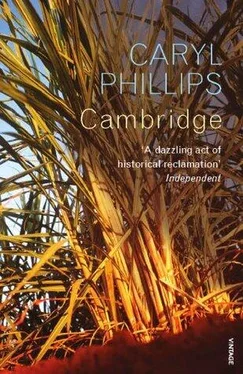Caryl Phillips - Cambridge
Здесь есть возможность читать онлайн «Caryl Phillips - Cambridge» весь текст электронной книги совершенно бесплатно (целиком полную версию без сокращений). В некоторых случаях можно слушать аудио, скачать через торрент в формате fb2 и присутствует краткое содержание. Год выпуска: 2009, Издательство: Vintage Digital, Жанр: Современная проза, на английском языке. Описание произведения, (предисловие) а так же отзывы посетителей доступны на портале библиотеки ЛибКат.
- Название:Cambridge
- Автор:
- Издательство:Vintage Digital
- Жанр:
- Год:2009
- ISBN:нет данных
- Рейтинг книги:5 / 5. Голосов: 1
-
Избранное:Добавить в избранное
- Отзывы:
-
Ваша оценка:
- 100
- 1
- 2
- 3
- 4
- 5
Cambridge: краткое содержание, описание и аннотация
Предлагаем к чтению аннотацию, описание, краткое содержание или предисловие (зависит от того, что написал сам автор книги «Cambridge»). Если вы не нашли необходимую информацию о книге — напишите в комментариях, мы постараемся отыскать её.
Cambridge — читать онлайн бесплатно полную книгу (весь текст) целиком
Ниже представлен текст книги, разбитый по страницам. Система сохранения места последней прочитанной страницы, позволяет с удобством читать онлайн бесплатно книгу «Cambridge», без необходимости каждый раз заново искать на чём Вы остановились. Поставьте закладку, и сможете в любой момент перейти на страницу, на которой закончили чтение.
Интервал:
Закладка:
Unfortunately, I have heard several reports, some indeed furnished by negro servants themselves, that the black is addicted to theft and deceit at every opportunity. The average negro would not feel out of place in London's infamous thieves' kitchen of Seven Dials. His thievishness is more than a match for all the laws that can emanate from any parliament, and even when apprehended in the act the black will invariably fly into a passion if you refuse him the honour of being able to take up the book and swear to the truth of what he knows to be false. This prevalent knavery is considered by many negroes to be no crime so long as it passes undiscovered. So adroit are they in this that the shame lies in their being apprehended rather than in the act itself. Sad to say, this pilfering habit is apparently engrafted onto them by elder negroes, who consider the teaching of ingenious theft a most necessary part of their parental duties.
I have already commented upon their love, which is no more than brutish gratification of animal desire. The negro father, having been deprived of authority and power over his children, and wielding no responsibility for their welfare, is the least attached to his offspring. The mother, upon whom the child is dependent for nourishment during its first year, is by natural law party to a deeper involvement, but none of the sacred responsibilities which ennoble the relation of child to parent is present in this world. Unfettered by requirements of support and education, the grace of the parental affections is lost to both father and mother, and it becomes mere breeding, bearing, and suckling, and nought beside. Without wishing to gloss over their errors, I must acknowledge that negroes appear to be generally good-humoured in the highest degree, though untempered to the civilized ways of man.
This evening I took a recuperative walk in the company of my faithful Stella. The air had been cooled by the constant breeze, and we were not in the least incommoded. I had the opportunity to admire at close quarters the lofty cedars which surround the Great House and relieve it somewhat from the intense heat. I was also fortunate enough to be able to witness the negroes at work and play, their behaviour being interpreted with a suitable commentary by Stella. The first negroes I met were those returning from the mountains, some riding donkeys, some on foot, all laden with hampers of provisions. By law they are allowed only every other Saturday for the purpose of cultivating their mountain-grounds. By allowing them more time, especially during the slack season which we have now entered, they grow fond of their cultivation and are likely to raise more food for themselves and their offspring, thus relieving the estate a little from the heavy burden of feeding as well as clothing them. Also, if they are encouraged to visit more man the permitted once a fortnight, they bring back smaller quantities of goods and are much less likely to be cajoled into selling their surplus to passing free blacks, thus depleting their own stocks, weakening their constitutions, and in consequence reducing production on the estate.
The negroes in the field, including two batches of small black fry, were fast approaching the end of their day's labour and readying themselves for the short march back to the negro village. Each group of ten negroes is supervised by a driver, who walks behind, bearing both a short and a long whip. Above them all is the Head Driver, who carries with him the emblem of his rank and dignity, a polished staff upon which he can lean. He is the most important personage in the slave population of an estate, and it is he who takes daily charge of the great gang, which is comprised of the most powerful of the field-negroes. Ideally, he should be an athletic man of respected character, clean in his person and habits; if possible a creole long used to field-work, one marked out for his sobriety, patience and general civility. Most important, he should always show respect towards white people, and suffer no undue freedom of conversation or indulgence in trivial humour from those beneath him. A negro-man such as this must indeed be difficult to acquire. As they began to march I made note that male and female were naked down to the waist, and I could often observe where the application of the lash had sculpted a hideous pattern of weals upon their broad black backs. The children of the sun are mortals, and accordingly possess their share of failings and must endure the crack of the inhuman whip. But its use must be judicious, for there can be little more offensive to the human spirit than to observe the cattle-whip being inflicted with all the severity of vindictive malice. This, I must admit, I was unfortunate enough to witness, the villain bestowing the rope's-end being none other than Mr Brown.
This coarse man had before him a black Hercules of a brute who far outweighed and outspanned him. They stared at each other, their hatred undiluted, but the grey-haired blackie displayed no hint of trepidation at what might follow. In the distance his fellow field-workers trudged on towards the village, reluctant to turn their heads for fear of what they might witness. However, not for one moment did I doubt that their pounding hearts were not with their refractory fellow negro, and if I am to be honest I would have to add that theirs were not the only hearts whose sympathies leapt instinctively to this poor unfortunate. And so Mr Brown raised and cracked his cattle-whip, and in a moment down dropped the aged black upon his knees. But still he stared up in defiance, his dark eyes bright in the sun. Stella shook her head and seemed loath to answer my questions as to the cause of this brutality. All I could obtain from her was the intelligence that the black has a history of insubordination, and that massa foolishly seeks to make him more ruly by inflicting stripes. Again the crack as the whip struck the poor wretch, whose very posture made plain that he would sink no further unless the very sky should tumble down upon him. Once again Mr Brown raised the whip in his hand, but the negro, although well acquainted with its weight, steadfastly refused to flinch away. I asked Stella if it was common for Mr Brown to administer such flagellation. Could not one of his white assistants do this with more propriety? Stella answered that, 'Massa like to punish bad niggers himself, den dey know who Buckra be.' I could do no more than nod my head.
I was by now ready to abandon this remedial walk abroad, but Stella insisted that I should see something that might help to revive my ailing spirits. And of course she was correct, for indeed I have never witnessed so picturesque a scene as a negro village. Each house is surrounded by a small garden, and the whole village criss-crossed by miniature lanes bordered with sweet-scented flowering plants. The gardens of the negroes are not like the kitchen-gardens of England, planted with functional, plain vegetables, and the odd shrub of gooseberry or patch of strawberry. No, the negro grows his provisions in his mountain-grounds and harvests them once a fortnight, as I have described. These village gardens are decorative groves of ornament and luxury, and filled with a profusion of fruits which boast all the colours of the rainbow from the deepest purple to the brightest red. If I were to be asked if I should enter life anew as an English labourer or a West Indian slave I should have no hesitation in opting for the latter. It seems to me manifestly worth abandoning the propriety and civility of English life for the pleasant clime of this island and the joyous spirit which abounds upon it. One can always devise ways to feed the intellect, but how many of us neglect the soul, the inner self who too quickly becomes desiccated.
In this country there is scarce any twilight, and in a single moment all nature seems to falter. All nature, that is, apart from the negroes, who take this opportunity to enjoy, under the cover of darkness, their favourite pastime of dancing. It is impossible for words alone to describe what these people achieve with their limbs and faces. To me their movements appeared to be wholly dictated by the caprice of the moment, but Stella informed me that these dances obey regular figures, and that the least mistake, or a single false step, is noticed by the rest. They have dances which represent not only courtship and marriage, but being brought to bed. The musical instruments to which they leap and shake are Ebo drums, whose beat is made more harmonious by the accompaniment of a black who rattles a bladder stuffed with a parcel of pebbles, while yet another holds a piece of board upon which he beats two sticks. The principal part of the music is vocal, with one girl singing a verse and being answered by choral cries. To make out either rhyme or reason was impossible, and Stella seemed loath to offer me assistance. By this I assumed that the songs were about massa, and were perhaps too ironical in tone to be comfortably translated. Such a noise I never did hear. Having begun shortly after sun-down, the blacks, Stella informed me, might continue their revelry until the first peep of day. This being the case it was deemed judicious that I return to the Great House and take my rest.
Читать дальшеИнтервал:
Закладка:
Похожие книги на «Cambridge»
Представляем Вашему вниманию похожие книги на «Cambridge» списком для выбора. Мы отобрали схожую по названию и смыслу литературу в надежде предоставить читателям больше вариантов отыскать новые, интересные, ещё непрочитанные произведения.
Обсуждение, отзывы о книге «Cambridge» и просто собственные мнения читателей. Оставьте ваши комментарии, напишите, что Вы думаете о произведении, его смысле или главных героях. Укажите что конкретно понравилось, а что нет, и почему Вы так считаете.












